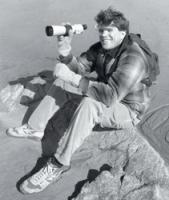John Brown: War Stories
Boston, January 1857
In my hotel room I took deliberate pleasure in bathing and shaving, rituals I was becoming reaccustomed to carrying out daily. This morning I would turn my efforts to the vital project of coaxing support from the wealthy abolitionists of Massachusetts. I put on the expected clothes: white shirt and neat black bow tie, brown broadcloth vest and jacket with its high leather collar. To move easily among the “gentlemen,” I would disguise myself as far as I could with the demeanor and grooming of what they would consider to be a proper fellow.
I had never felt less proper. Last May I had shot a bullet into the forehead of proslavery Constable James Doyle. The bullet had not hurt Doyle; he was already dead by Owen’s sword. But shooting Doyle had altered me. Pulling that trigger had cut off any return path to easy life. I was stripped of certain human possibilities. Already weakened tender parts had since withered further within me, separating me more from the commonly acceptable community. Since coming East I had not visited my wife, Mary Day, and my children on the upstate New York farm as I should have and as I had led some people to believe I would. Though others could not yet see this, I knew my family was already lost to me.
I left my revolvers in the hotel room. Bounty hunters searched for runaway slaves in Boston now and street scuffles could erupt. No matter what injustice I witnessed here, I would avoid violent engagement. I must not draw the attention of federal marshals, who could arrest me.
The new horse-drawn rail cars were running, as well as the traditional one-horse shays, but I chose to walk the busy streets of Boston. I admired the many shops with their wide awnings, some with their goods set out front on trays. Three- and four-story brick buildings lined the short length of School Street, where my correspondent Franklin Sanborn was expecting me in his office.
* * *
“This is indeed a pleasure,” Franklin Sanborn said. He was a small man, a recent Harvard grad. His moustache tailed down stylishly at the sides to his chin.
“For me, as well. More than you could know.” I gripped Franklin’s bony hand, which struck me as in some way like the handle of a water pump. I would lift and lower this hand and many other hands in the coming weeks, raising money from deep reservoirs for the cause.
We sat in facing chairs in the receiving room. A servant brought a silver tray with cups and teapot.
“You have developed a circle of admirers,” Franklin said.
“A strange fact for me. In our world of wonders, I am only a laborer.”
“You are more than that,” Franklin said. “Quite a lot more.”
“Newspaper readers can only be admiring a man who does not exist, a collection of hints, a construction in their thoughts, in hopelessly incomplete understanding.”
“Perhaps,” Franklin said. “But you represent action. Many of us are very tired of endless talk and setbacks in the field.”
“I share their impatience. I need support for the cause in Kansas. I need money. A lot of money.”
There, I had delivered the…was it a lie?…call it a shaded misrepresentation. I needed money, yes. And I would channel any resources I could obtain into the cause of fighting slavery, but not in Kansas Territory. The location was the falsehood.
Franklin regarded me intently. “With your permission,” he said. He approached my neck with his hands and made an adjustment to my necktie. Then he patted my chest. “Some people I know want to meet you. Wealthy people. Avid supporters of the cause.”
I experienced a terrible tingle in the face and arms, as though a layer of dirt beneath the skin was interfering with the flow of natural fluids.
“So be it. Let us meet them.”

J.W.M. Morgan is writing a series of linked stories about the inspiration of the abolitionist John Brown. His stories have appeared in Valparaiso Fiction Review, The Courtship of Winds, Azure, Diverse Voices Quarterly, The Montreal Review, Lady Churchill’s Rosebud Wristlet, War, Literature & the Arts, and other magazines. He lives in Oakland, California, where he teaches and mentors people who are developing basic skills. J.W.M. recommends Refugee & Immigrant Transitions.


